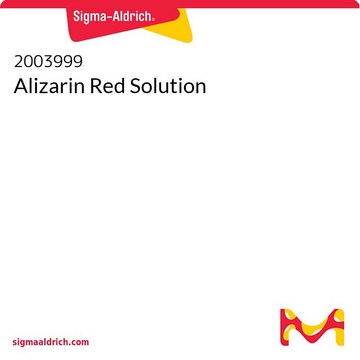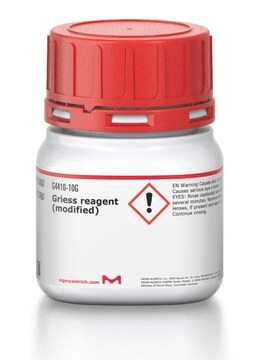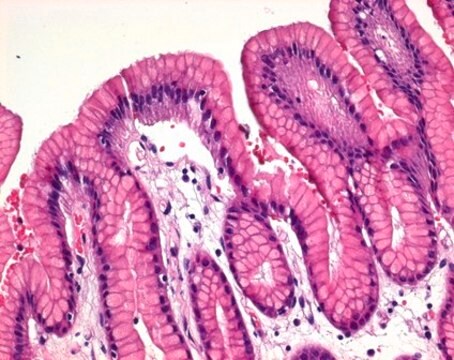1.06278
Alizarin red S mono sodiumsalt (C.I. 58005)
pH indicator
Synonym(s):
Alizarin red S mono sodiumsalt (C.I. 58005)
About This Item
Recommended Products
product name
Alizarin red S mono sodiumsalt (C.I. 58005), visual transition interval 4.3-6.3, yellow to pink, visual transition interval 9.4-12.0, brown-orange to violet
loss
≤10% loss on drying, 110°C
Quality Level
visual transition interval
4.3-6.3, yellow to pink
9.4-12.0, brown-orange to violet
Amax
418-424 nm (buffer pH 4.3
buffer pH 4.3
1 buffer pH 4.3)
444-450 nm (buffer pH 9.4)
510-517 nm (buffer pH 6.3)
554-558 nm (buffer pH 12.0)
storage temp.
2-30°C
InChI
1S/C14H8O7S.Na/c15-11-6-3-1-2-4-7(6)12(16)10-8(11)5-9(22(19,20)21)13(17)14(10)18;/h1-5,17-18H,(H,19,20,21);/q;+1/p-1
InChI key
HFVAFDPGUJEFBQ-UHFFFAOYSA-M
Related Categories
General description
Application
- A ratiometric fluorescence strategy based on inner filter effect for Cu(2+)-mediated detection of acetylcholinesterase.: This study utilizes Alizarin Red S to develop a fluorescence-based method for detecting copper ions and acetylcholinesterase activity, important for environmental monitoring and medical diagnostics (Li et al., 2021 doi:10.1007/s00604-021-05044-0).
- Multiplex SERS Chemosensing of Metal Ions via DNA-Mediated Recognition.: Explores the complexation of Alizarin Red S with different metal ions, utilizing Surface-Enhanced Raman Spectroscopy (SERS) for sensitive detection, which can be applied in environmental analysis and health sciences (Guerrini and Alvarez-Puebla, 2019 doi:10.1021/acs.analchem.9b02385).
- Capsicum-Derived Biomass Quantum Dots Coupled with Alizarin Red S as an Inner-Filter-Mediated Illuminant Nanosystem for Imaging of Intracellular Calcium Ions.: This innovative approach uses Alizarin Red S in a composite nanosystem for advanced imaging techniques to monitor intracellular activities, offering potential in biomedical research and diagnostics (Chen et al., 2018 doi:10.1021/acs.analchem.8b04055).
- Ratiometric fluorescent probe based on gold nanoclusters and alizarin red-boronic acid for monitoring glucose in brain microdialysate.: Highlights the application of Alizarin Red S in developing a glucose monitoring system, which is critical for understanding metabolic processes in neurological studies (Wang et al., 2014 doi:10.1021/ac5023293).
Analysis Note
1st transition range: pH 4.3 - pH 6.3 Lightly yellow - pink
2nd transition range: pH 9.4 - pH 12.0 Brown orange - violet
Absorption maximum λ 1 (buffer pH 4.3): 418 - 424 nm
Absorption maximum λ 2 (buffer pH 6.3): 510 - 517 nm
Absorption maximum λ 3 (buffer pH 9.4): 444 - 450 nm
Absorption maximum λ 4 (buffer pH 12.0): 554 - 558 nm
Spec. Absorptivity A 1%/1cm (λ1max; 0.01 g/l; buffer pH 4.3; calc. on dried substance): 135 - 180
Spec. Absorptivity A 1%/1cm (λ2max; 0.01 g/l; buffer pH 6.3; calc. on dried substance): 145 - 210
Spec. Absorptivity A 1%/1cm (λ3max; 0.01 g/l; buffer pH 9.4; calc. on dried substance): 170 - 230
Spec. Absorptivity A 1%/1cm (λ4max; 0.01 g/l; buffer pH 12.0; calc. on dried substance): 340 - 520
Loss on drying (110 °C): ≤ 10 %
Storage Class Code
11 - Combustible Solids
WGK
WGK 3
Flash Point(F)
Not applicable
Flash Point(C)
Not applicable
Certificates of Analysis (COA)
Search for Certificates of Analysis (COA) by entering the products Lot/Batch Number. Lot and Batch Numbers can be found on a product’s label following the words ‘Lot’ or ‘Batch’.
Already Own This Product?
Find documentation for the products that you have recently purchased in the Document Library.
Our team of scientists has experience in all areas of research including Life Science, Material Science, Chemical Synthesis, Chromatography, Analytical and many others.
Contact Technical Service






